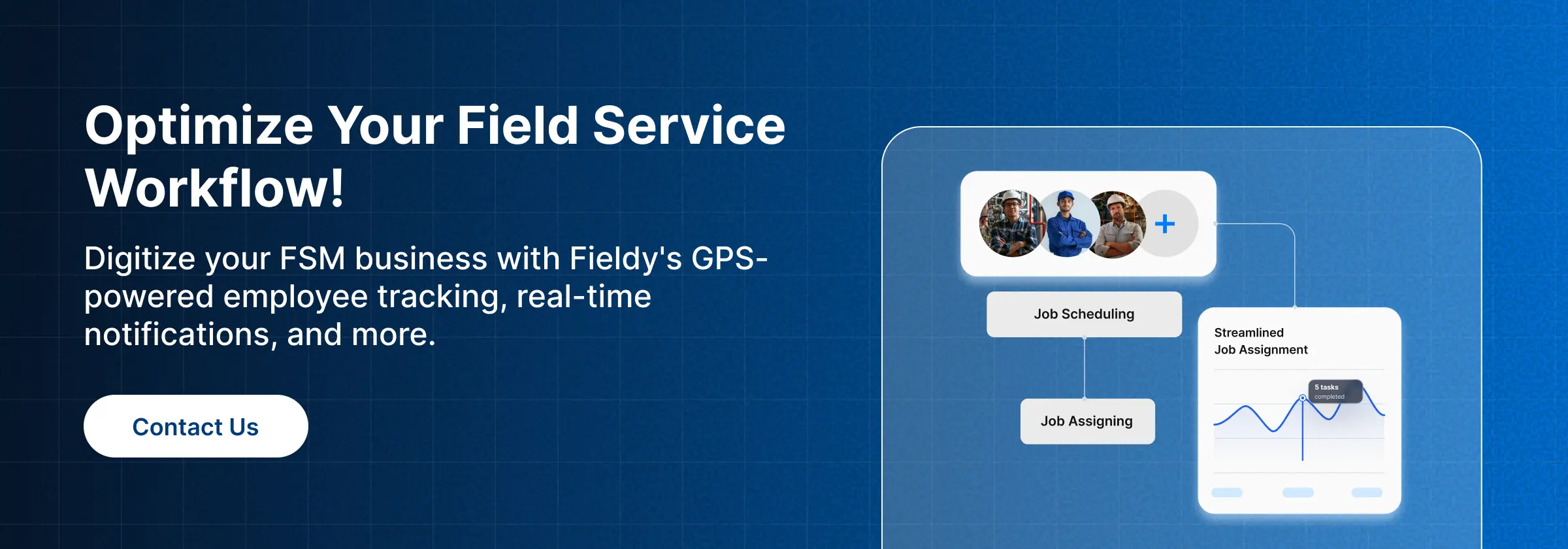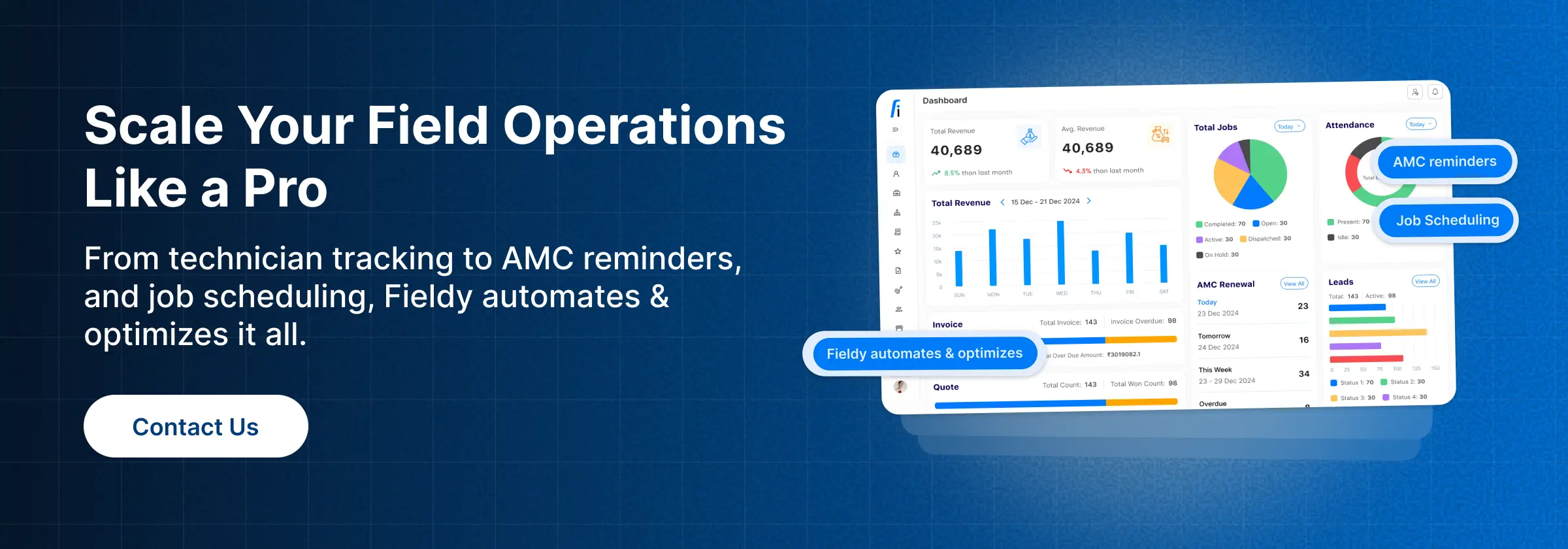Contracts-the unseen backbone that holds every field service operation together. Any service visit, SLA, or vendor agreement requires a contract: contracts set scopes, timelines, and obligations-interesting factors for customer satisfaction and profit!
Yet, many companies still manage contracts using disparate methods of spreadsheets, emails, or physical files-drip-does that cause renewals to be missed, compliance blocks, and revenue leakage.
Given the working world that expects mobility for cases and is a rising expectation for customers, digitizing contracts is not a choice but an option by 2026. Modern FSM tools integrate with contract management software to give a complete view of the entire lifecycle-from creation to execution, compliance, and renewal on a single platform.
Want to understand how these basics are constructed? Check out our “What is Field Service?” guide.
What Is Contract Management Software?
Contract Management Software Definition
In essence, contract management software is a digital tool for automating the lifecycle of contracts-from drafting and negotiation to compliance monitoring and renewals. It serves as a central repository for documents, generates streamlined approval paths, and minimizes errors typically associated with manual processes, replacing former paper-based workflows with digital dashboards and automated alerts.
This means that in field services, any service agreement, vendor contract, or SLA is directly linked to operational tasks like scheduling, dispatch, or invoicing through Field Service Contract Management. The system keeps deadlines in check, ensures documents aren’t misplaced, and keeps everyone, from technicians to managers aligned on obligations and timelines.
Why Is Contract Management Software Important in Field Service?
Tracking contracts by hand carries a high risk, especially if multiple vendors, technicians, and locations must be accounted for. Here’s why embracing this solution becomes important:
Compliance and SLA Management
In regulated industries like electrical maintenance or healthcare equipment servicing, failure to meet SLAs could cost thousands in fines. The contract management software automatically reminds of inspections, renewals, and compliance tasks- making sure no obligations are ever missed. According to Gartner’s 2024 report, companies that used automated contract tracking experienced a 28% decrease in compliance violations.
Avoiding Manual Error & Lost Contracts
Lost paperwork means lost revenue. Contract digitization may keep human error to a minimum of 70% (Forrester, 2023) and resolves disputes faster because every single version is stored and timestamped.
Managing Vendor Agreements
Field service includes subcontractors, plumbers, electricians, or seasonal HVAC crews. Having contracts connected with Vendor Contract Management Software stands to ensure proper vetting, onboarding, and performance tracking for external parties.
What to Look for in Field Service Contract Management Software?
When seeking any software tool for contract management, give preference to elements that cater to field service needs and not just a generic legal group.
Automated Alerts and Renewals
Never miss a deadline. The system notifies you of the expiry well in advance so arrangements can be made for renegotiation or termination.
Customizable Contract Templates
HVAC, plumbing, pest control-all have very specific contract needs. Industry-specific pre-written templates reduce drafting time while remaining legally binding.
Technicians and Admins Have Real-Time Access
Mobile compatibility allows technicians to view service-level agreements (SLAs), warranty terms, and service scope right at the site. Admins can even approve and amend contracts before hitting the office.
Job Scheduling and Invoicing Integration
Apart from contracts, the best solution, such as Fieldy, integrates with Field Service Scheduling Software and field service invoicing software. Signing a contract automatically schedules related tasks, tracks them, and bills them-thus saving a lot of time and otherwise mismatched obligations.
How Does Contract Management Software Benefit Enterprises in the FSM Field?
Centralized Contract Repository
No more scattered files, one digital location holds all client and vendor agreements. This reduces search time and ensures audit readiness.
Quicker Turnaround Times on Approvals
With e-signatures and automated routing, approvals are completed in hours instead of days. Companies adopting digital approvals report 35% faster project kickoffs (ContractWorks, 2024).
Transparent Reporting & KPI Tracking
Contract data ties directly to KPIs like response time, first-time fix rate, and SLA adherence. For insights, check our field service KPIs and metrics.
How to Choose the Right Contract Management Software
Choosing contract management software is not just about checking off features, it’s about finding a solution that fits your business model, growth plans, and industry compliance requirements. A poorly chosen tool can create more complexity than it solves, while the right software can boost efficiency and save significant costs over time.
Key Considerations
Scalability
Will the software grow with your company? As field service businesses expand into new territories or add seasonal technicians, the system should handle increased contract volumes without performance issues.
Stat Insight: According to a 2024 FSM Benchmark Report, 42% of companies switch platforms within two years because their initial solution fails to scale with operations.
User Permissions
Contract data often includes sensitive financial or legal terms. Look for software that allows granular access controls, so technicians can view service-level agreements while finance or legal teams handle approval workflows. This not only enhances security but also supports compliance with privacy standards like GDPR.
Custom Workflows
Field service operations rarely follow a one-size-fits-all process. Does the platform allow you to customize approval hierarchies or automate compliance checks based on service type?
Example: An HVAC company may need a multi-step review for government contracts, while plumbing service agreements may only need technician and manager approval.
Evaluate Based on Industry Needs
Different industries have different contract demands:
- HVAC contracts often focus on seasonal maintenance cycles and energy compliance.
- IT field service contracts may prioritize data security clauses and uptime SLAs.
- Plumbing services often rely on equipment warranties and emergency response agreements.
Choosing software with industry-specific templates and automation reduces setup time and ensures compliance from day one.
Stat Insight: Fieldy data from 2023 shows that companies using industry-tailored CLM templates reduce contract creation time by 35% and SLA breaches by 22%.
What Does Contract Management Software Cost?
The cost of contract management software varies widely depending on the size of your team, the number of contracts managed, and the complexity of features required. Field service companies, from small plumbing firms to nationwide HVAC providers, need scalable pricing models that align with their growth stage and operational needs.
Typical Pricing Models
- Small Teams (1–20 Users)
Basic plans start at $20–$50 per user/month. These usually cover core features such as:
- Centralized document storage
- Automated renewal alerts
- Basic compliance tracking
Ideal for startups or local service providers needing a simple upgrade from spreadsheets.
- Mid-Sized Enterprises (20–100 Users)
Expect pricing between $50–$100 per user/month. These plans include:
- Integration with FSM tools (scheduling, invoicing)
- Performance analytics and reporting dashboards
- Mobile access for technicians in the field
Mid-sized businesses benefit most from these plans because they balance advanced features with affordability.
- Enterprise-Grade Solutions (100+ Users / Multi-Location)
Large enterprises often require custom pricing. Costs depend on:
- Volume of contracts managed monthly
- API integrations with ERP/CRM systems
- Advanced security, role-based permissions, and multi-region compliance features
Custom quotes also include onboarding, training, and priority support for seamless adoption.
Additional Cost Factors to Consider
- Implementation Fees – Most solutions involve a one-time setup cost, usually between $1,000 and $10,000. This depends on factors like migrating data from older systems, initial configuration, and any custom workflows required for the business.
- Training and Support – While basic training is often included, vendors may charge extra for detailed onboarding sessions or round‑the‑clock support. These services help teams adapt quickly and ensure smooth operations post‑deployment.
- Feature Add‑Ons – Advanced capabilities such as AI‑driven analytics, contract automation, or e‑signature tools may not be part of the base package and could incur additional fees. These add-ons can significantly enhance efficiency but increase total costs.
Stat Insight: According to a 2024 G2 report, companies adopting CLM software reduce overall contract management costs by 20–30% annually due to fewer missed renewals, minimized legal risks, and faster job deployments.
Fieldy’s Approach to Pricing
Fieldy offers flexible tiers to accommodate every stage of growth, from small contractors to enterprise-level service providers. Whether you’re managing 10 contracts or 10,000, pricing adapts to your specific requirements without forcing you into oversized plans.
For an exact cost estimate, businesses can request a free demo or consult with Fieldy’s sales team to align features with budget.
Bottom line
Digitize and Streamline Your Contracts in 2026
The era of spreadsheets and paper files is over. Field service companies that digitize contract workflows gain speed, compliance, and trust, all critical for 2026’s competitive landscape.
Ready to automate and track every contract in your business?
Get started with Fieldy’s Contract Management Software, purpose-built for modern field service teams.
FAQs:
What is contract management software?
A: Contract management serves as an automation tool that creates contracts, tracks them, or renews them for field-service operations, thereby reducing research errors, if any, and helping with compliance.
What does contract management software do?
A: Contract management software centralizes contracts, sends notifications for renewals, links up with scheduling, and efficiently makes sure service-level agreements are fulfilled.
Why is contract management software important for field services?
A: Contracts management software prevents missed deadlines, makes vendor management easier, and ensures uniform performance across several teams.
How much does contract management software cost?
A: It could cost anything—a simple plan may start from $20 a month per user, while enterprise plans will be equipped with advanced analytics and integrations.
What to look for in contract management software?
A: Most important features for contract management software are automated alerts, mobile access, the ability to customize templates, and FSM integration for scheduling and invoicing.




